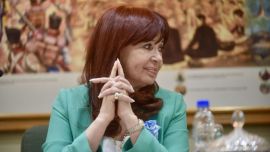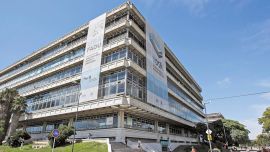Since the week started with the presentation of ex-president Mauricio Macri’s second book Para Qué (a title to which his enemies might be tempted to add question-marks), this column aims at supplementing his manifesto with an unofficial and incomplete biography based on personal perceptions going back almost exactly three decades.
It was the spring of 1992 when I first ran across Macri at a British Embassy reception in the prelude to the privatisation of Aguas Argentinas by the Carlos Menem presidency where Thames Water (in partnership with Socma, the holding of the Macri family) was a frontrunner. Nevertheless, some months later the waterworks went to the French Suez/Lyonnaise des Eaux, who undercut the Thames Water bid by just a couple of cents so clearly they were in the know. Which did not surprise me in the least because at that reception Macri was telling every man and his dog what the Thames Water bid was – even I knew. Anyway that is all water long under the bridge with Argentina’s water now in the safe (?) hands of Economy Minister Sergio Massa’s better (?) half, Malena Galmarini.
Obviously my interaction with Macri started off on the wrong foot but, far more importantly, I would argue that he started off on the wrong foot. Government and leftist critics love to demonise Macri as the incarnation of all the evils of big business, based largely on his surname, but his career in the family business lasted hardly a decade with little to show – perhaps presiding Sevel auto company was closest to a comfort zone, given his civil engineering degree. Looking at tycoons worldwide over time, their flair for business is so rarely passed onto often spoiled offspring and descendants – perhaps since Indian wealth is suddenly in vogue with Britain’s new prime minister Rishi Sunak, Ratan Tata might be cited as an exception to that rule, showing himself to be as brilliant a businessman as his great-grandfather the Tata Group founder Jamsetji Tata (1839-1904). Even when subsequent generations achieve fame, it is rarely in business – thus Nelson Rockefeller shone in politics and this column would argue that Macri is a similar case in point.
His three terms at the helm of Boca Juniors (1995-2007) were far more of a comfort zone than his family business years (1984-1995) as well as a perfect springboard for popularising the centre-right – the 17 titles he won eclipse even the 14 of River Plate’s recently retired Marcelo Gallardo. Yet despite this Midas touch, the football world let him down badly on at least one front – the disastrous choice of soccer transfer agent Gustavo Arribas to head Argentina’s murky intelligence services. This columnist does not understand why Juntos por el Cambio is so evasively defensive about the illegal espionage during his presidency – spies always spy because that is the nature of the beast, before, during and since Macri, so why not simply say so? Perhaps there is a reluctance to emulate Cristina Fernández de Kirchner’s defence line about all public works being inherently corrupt.
At his book launch Macri underlined how the Cromañon disco blaze tragedy awoke in him a sense of public duty drawing him into politics. Yet this is belied by the simple fact that he founded Compromiso para el Cambio in mid-2003, running for mayor that year and even winning the first round, whereas the Cromañon disaster was right at the close of 2004. This shows that while Macri quite legitimately blasts Kirchnerite narrative, he runs his own narrative too. He likes to cultivate an image of “straight thinker” and “what you see is what you get” but he surrounded himself with spin doctors like Jaime Durán Barba and Marcos Peña and is no stranger to the world of postmodern, post-truth communication.
During that 2003 mayoral campaign, I was a privileged reporter at an Argentine-British Chamber of Commerce working breakfast with him, where I found his reaction to critical questions extremely testy, as if he assumed to have immunity from them on what he considered home ground. Thereafter Macri rose way beyond my level and I was never physically close to him either as City Mayor or President. Nor close to him in any other sense – when Elisa Carrió said in 2007: “My limit is Macri,” she echoed my feelings exactly although warming to him since then (not nearly as warmly as Carrió, though).
Polarisation conspires against any balanced assessment of Macri. His presidency clearly came to a bad end in 2019 but how much of that was anticipation of the current administration in the 17 weeks between the PASO primaries and the change of government? In the month before PASO (July) an industrial growth of 4.8 percent more than doubled the inflation of 2.2 percent. Just to give one very recent example of how polarised vision skews perception, there has been an uproar this week over the taxation of judges as an evil Kirchnerite move to intimidate the courts trying corruption but the date for the law making judges liable to taxation was December 27, 2016 – under the Macri presidency – so that the initiative is neither unreasonable nor Kirchnerite.
Anyway, if Para Qué has 261 pages to unfold Macri’s truths, this column does not even have 261 lines. We will leave Macri for now pondering, Hamlet-like, whether to run or not to run while perhaps bemoaning like Hamlet: “The time is out of joint; O cursed spite!/That ever I was born to set it right.”



















Comments